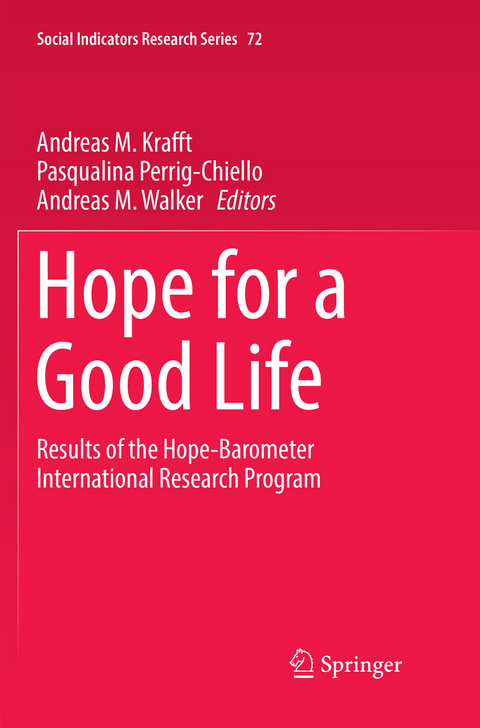
Hope for a Good Life
Springer International Publishing (Verlag)
978-3-030-08706-7 (ISBN)
Andreas M. Krafft holds a doctoral degree in Management Sciences at the University of St. Gallen with special focus on Organizational Psychology, Culture and Development. He has a specialization in Social Psychology of Organizations as well as in Work and Health Psychology. Dr. Krafft is Associate Researcher and Lecturer at the Institute for Systemic Management and Public Governance at the University of St. Gallen and Lecturer at the University of Zürich in the field of Work and Health. Furthermore, he is member of the Executive Board of Swissfuture, the Swiss Society of Futures Studies and since 2010 responsible for the Hope-Barometer. Dr. Krafft develops volunteer work in an NPO dedicated to the assistance of people particularly with chronic, non-curable or terminal diseases with special focus on Latin America. He wrote several publications on management related topics, specifically on the role of Leadership and Innovation to promote Personal Wellbeing. He is member of the International Positive Psychology Association and of the Swiss Positive Psychology Association. Pasqualina Perrig-Chiello is professor emeritus of psychology at the University of Bern. Her research and teaching focus on topics of life-span developmental psychology, especially individual differences in well-being and health and familial intergenerational relations: solidarity, family caregiving, biographical transitions (leaving home), critical life events (divorce). Professor Perrig-Chiello is an expert in family issues over life span. She chaired and carried out various research projects around family issues, such as a national research program on intergenerational relations in Switzerland, or the Swiss Study on family caregivers SwissAgeCare-2010 und AgeCare-SuisseLatine-2011, and edited the "Swiss Generation Report" (2008), the "Swiss Childhood & Youth Report" (2008), and the "Swiss Social Report with focus on generations" (2012). She is member of the Editorial Board of several international scientific journals, and was member of the National Research Council of the Swiss National Science Foundation and of the Standing Committe for the Social Sciences of the European Science Foundation, Strasbourg. Author of over 200 scientific publications.
Part I. Introduction, General Topics and Results of the Hope-Barometer (Andreas Krafft and Andreas Walker).- Chapter 1. Purpose and Development of the Hope-Barometer.- Chapter 2. Theories of Hope.- Chapter 3. Methodology.- Chapter 4. Descriptive Results from the Hope-Barometer.- Chapter 5. Comparative Results - International Comparisons.- Chapter 6. Hope and Other Positive Attributes (correlation Between Constructs).- Part II. Specific Topics on Hope.- Chapter 7. Psychological Resources, Strengths, and Resilience (Slezácková).- Chapter 8. Hope and Well-being: A Question of Age and Generation? (Spahni).- Chapter 9. Partnership, Separation, Divorce, and Widowhood (Spahni).- Chapter 10. Believes, Faith, Spirituality, and Religiosity (Margelisch).- Chapter 11. Are Polish People Less Happy than the Rest of Europeans? The Role of Affect, Engagement, Meaning and Hope (Kasprzak).- Chapter 12. Passion, Hope and Optimal Functioning in Society (Martin-Krumm).- Part III. Interventions, Lessons Learnt, and Final Remarks (Andreas Krafft and others).
| Erscheinungsdatum | 31.03.2021 |
|---|---|
| Reihe/Serie | Social Indicators Research Series |
| Zusatzinfo | XI, 215 p. 30 illus. |
| Verlagsort | Cham |
| Sprache | englisch |
| Maße | 155 x 235 mm |
| Gewicht | 480 g |
| Themenwelt | Geisteswissenschaften ► Psychologie ► Humanistische Psychotherapien |
| Geisteswissenschaften ► Psychologie ► Psychoanalyse / Tiefenpsychologie | |
| Studium ► Querschnittsbereiche ► Prävention / Gesundheitsförderung | |
| Sozialwissenschaften ► Soziologie ► Empirische Sozialforschung | |
| Schlagworte | Hope and Positive Attributes • Hope and Well-being • Hope Barometer • Hope, Believes, Faith and Spirituality • Hope Interventions with Children and Youth • Hope, Strengths and Resilience • Hope Web-based Interventions • Mindfulness and Meditation • Passion, Hope and Optimal Functioning • The Role of Social Environment |
| ISBN-10 | 3-030-08706-9 / 3030087069 |
| ISBN-13 | 978-3-030-08706-7 / 9783030087067 |
| Zustand | Neuware |
| Haben Sie eine Frage zum Produkt? |
aus dem Bereich


